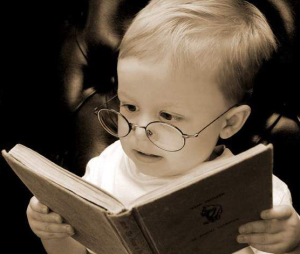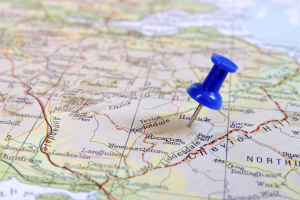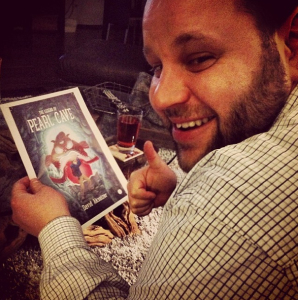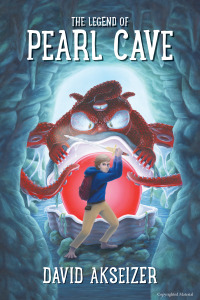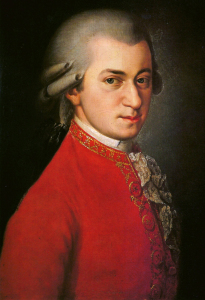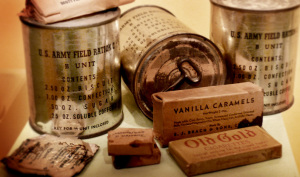
C-Ration Cans
By Obie Yadgar
I was resting against a wall of sandbags and forcing down cold spaghetti and meatballs from a C-Ration can when I noticed her sitting on her hind legs a few feet away and wagging her tail. She was some non-descript dog, a mutt, and all black except for a white spot on her chest, and if I didn’t know better, I think she was speaking to me. War plays with the mind, you know?
A pungent smell of vegetation and musty earth mixed with cordite and sulfur made my lunch even less appetizing. In the distance, sporadic crackle of small arms fire and heavy weapons reminded me of the war’s different faces.
“Well, Lady Dog, I suppose you’re happy to be here, too,” I said, hearing the sarcasm in my own voice. Why I called her Lady Dog I don’t know. The name just popped in my head, and I meant it in the way one would address a lady of noble birth. I can’t explain it, really. Maybe I saw something noble in a mutt that had survived a senseless and painful war and still wagged her tail.
Her Ladyship gave me a little bark and inched closer, still wagging her tail. Even a mutt welcomes a friendly voice, I thought to myself, and said, “Would you join me in this gastronomical pleasure?” I found a piece of palm leaf and spooned out half of my spaghetti delight onto it, extending my hand toward her. She moved close without fear and lapped the contents, licking the leaf and my hand along with it. From that moment on, Lady Dog and I were war buddies.
I had landed in Vietnam on Christmas Day, 1967, and now, early in 1968, the brigade to which I was assigned had just moved into the big basecamp at the coastal city of Quy Nhon and the four of us combat correspondents with the public information office were awaiting orders to set up our temporary tent. A short time later the brigade planned to convoy to Kon Tum in the central highlands, and little did I know Lady Dog would go along, and that we would have many conversations.
Lady Dog rarely left my side, except when I went out as correspondent on patrol and search and destroy missions with the infantry. During day, she would disappear for a time, to socialize with her dog friends or whatever she did, but you can bet she showed up at breakfast, lunch and dinner times. Since she was not allowed in the mess hall tent, I always brought her half of my food to share.
At night, she slept at the foot of my cot in the tent, although occasionally I heard her barking outside. I don’t know where she went, but feared one night she would wander around the guarded perimeter and blow herself up by a mine, or that her silent movement and shadow would invite a burst of machinegun fire from a soldier on guard in a bunker. Fortunately that never happened.
When the brigade set out for the central highlands in a long convoy, with helicopter gunships flying cover, my group rode in an open jeep somewhere in the middle of the convoy, two in the front seat and two in the back with Lady Dog in the middle in the back. The blinding red dust choked despite the bandanas we had tied around our nose like bandits in western movies.
Lady Dog had no such protection. I carried an extra canteen of water just for her to drink, pouring it into my steel helmet, and also used some of the water to moisten another bandana and wipe the cake of dust from her eyes every few minutes. For her food, a short C-Ration can was ideal, and she ate what I ate. Now and then when the convoy halted momentarily, I improvised a leash and let her out of the jeep; then it was back in and on the road again.
I do not remember how long the trip took, although I do remember arriving in Kon Tum before dark without an ambush or any other incidents. Throughout the difficult journey, Lady Dog rode along without causing us any problems in the jeep. She was a lady all the way.
Somewhere on the trip I remember saying to her, “Well, Lady Dog, it’s not exactly a ride in a Rolls Royce, but better this than chasing the convoy and chowing on dust.”
Lady Dog answered with a feeble bark.
“My thought exactly, dear lady,” I said wiping her eyes.
By the time the convoy arrived in Kon Tum, the central highlands red dust had turned Lady Dog’s coat gray. My new olive drab fatigues now were much lighter in color, as they would look months later, and the hot sun and the dust had shaded the uncovered part of my face in various colors. I was housed temporarily in a tent with a long-range patrol (LRP) team — about the gutsiest group of American soldiers I ever met. Lady Dog had already claimed her luxurious suite at the foot of my cot, and guys were gracious and noble enough to put up with her.
For the next few weeks, life fell into a routine, if you can have routine in war, that is. During the day Lady Dog did her usual disappearing act, showing up for breakfast, lunch and dinner. My cot was also my desk and I wrote hunched over my portable typewriter, Lady Dog snoozing at my side. Now and then I read a line aloud and said, “What do you think, Lady Dog?” If she lifted her head and looked up at me, I knew the line was good, and if not, I re-wrote it.
Lady Dog and I held numerous conversations about life in general, the arts, the war, and they were like playing chess with myself where I did the talking for the both of us. Then I was transferred to the division basecamp some distance away and to the main public information office and could not take her with me. It broke heart to leave her there, for we were war buddies, but war causes a stream of heartbreaks. I hugged her goodbye at the helicopter pad, fighting tears, and boarded the chopper with its rotary blades spinning in a deafening noise.
My last image of Lady Dog was sitting on her hind legs with her tail wagging — the way we met. I never saw her again, although the guys sent me a photo of her some months later showing Lady Dog with puppies. She was a sweet dog and I still miss her.
My Vietnam was a long ago, but I still think about it a lot, about the stupidity of it and the waste in human life and resources. And about the friends and the acquaintances I lost. Some things are foggy in my head, the dates and the sequence of events, but war has a way of lingering for life. The scars remain.
Every war leaves behind the heavy burden of memories, mostly bitter and painful, with a nugget or two of sweet. Lady Dog was such a nugget.

